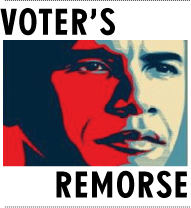More CEOs Seeing Obama As Bad Hire
IBDEditorials.com
The Presidency: He doesn't look or sound radical. President Obama, in fact, is so calm, almost regal, he makes government takeovers and redistribution schemes seem almost reasonable. But the facade is wearing thin.
Fortune 500 leaders who believed Obama's moderate rhetoric, and even raised cash and voted for him, have soured on him. They now believe he's bad for business and hostile to the American free enterprise system.
Even die-hard Obama fan Tom Wilson, head of Allstate, says the president could have used some executive experience on his all-academic economics team. Not a single former corporate executive is in Obama's Cabinet or among his top economic advisers. "I think it was a hiring mistake for the administration," Wilson told CNN last week.
Wilson also suggests Obama convene a summit with business leaders to clear the air. "I'd spend less time on the G-20 and more time on the U.S. 100," he advised.
Problem is, CEOs have walked away from prior White House luncheons shocked at (1) Obama's dismissive reaction as they try to explain the harm of his anti-business policies and (2) his shallow understanding of business and economic matters.
They're not just put off by the president's harsh depiction of "fat cat bankers" and other anti-business bashings. They're more disturbed by his arrogant ignorance. "The truth is that not even the Franklin Roosevelt administration was as hostile to and ignorant about free enterprise as this administration is," said publisher Steve Forbes.
Few before the election dared call Obama the "s" word. Independent voters, who ensured Obama's victory, generally considered him to be a centrist or slightly left of center. Now they view him as extremely liberal. And by Democrats' own polling, a solid majority — 55% — of all likely voters now think "socialist" is a more accurate way to describe Obama.
Hate to say we told you so. But we did.
In 2008, we ran a 16-part series called "The Audacity of Socialism" that warned that Obama was a closet socialist and, if elected, would lead the most anti-business administration in U.S. history. As proof, we offered countless examples of Obama's past associations with not just socialists, but also out-and-out communists, and dug into his voting record as the most liberal member of the Senate. We also explained how Obama used his training as an Alinsky street organizer to disguise his radicalism and appeal to the middle class.
Our series was panned by some as over the top and alarmist. But the record was there for anyone to see. If only others had called things by their proper names back then, to vet rather than anoint, we might be well into a robust recovery now, possibly even closing in on the Dow's pre-crisis peak of 14,000.
Instead, we have an economy that's a basket case, tied up by reams of new government red tape, and a market mired in uncertainty, trading in a narrow band reminiscent of the 1970s.
The reason: We have an administration that meddles in virtually every part of the economy, "injecting uncertainty into the marketplace and making it harder to raise capital and create new businesses," said Verizon Communications Chairman Ivan Seidenberg, an early Obama supporter now suffering buyer's remorse.
Capital is the lifeblood of the economy. Yet Obama is deliberately trying to downsize the financial sector. He says his sweeping new regulations are designed to clamp down on bank profits and shrink the sector as a share of the U.S. economy.
"What I think will change, what I think was an aberration, was a situation where corporate profits in the financial sector were such a heavy part of our overall profitability over the last decade," he says, adding that his "more vigorous regulatory regime" will "inhibit" the industry's growth.
Think about it: The president is engineering a controlled starvation of America's most important industry — financial capital — as punishment for allegedly causing a crisis that anti-bank community organizers and housing-rights zealots like him caused.
Intel CEO Paul Otellini, another early Obama supporter, now thinks the president "does not understand what it takes to create jobs." Yet he denies Obama is "anti-business."
It's time we stopped giving this president the benefit of the doubt, stopped holding back candid criticism. Too much is at stake. The signs that he's implementing a radically anti-capitalist agenda are too many and too obvious to ignore.
Given Obama's background, what could possibly make anybody think he would be pro-business?
As we argued before the election, it's no coincidence that:
Ward Connerly, a conservative former University of California regent, says he's known many community organizers and all believed capitalism was evil and needed to be replaced by socialism.
"Every community organizer I've known believes that the system is inherently flawed," he said. "Capitalism doesn't work in their view, because it doesn't distribute enough of its benefits to enough people."
Perhaps Obama has outgrown such idealism? Not a chance.
"My views are not so much more refined than they were when I labored in obscurity as a community organizer," Obama revealed the year before he launched his run for the White House.
Obama's not a liberal in the tradition of Bill Clinton, Jimmy Carter or
even Roosevelt. Obama's a liberal like we've never seen before. And he's
planning to do even more damage to the economy, making November's election
one of the most important in history.
